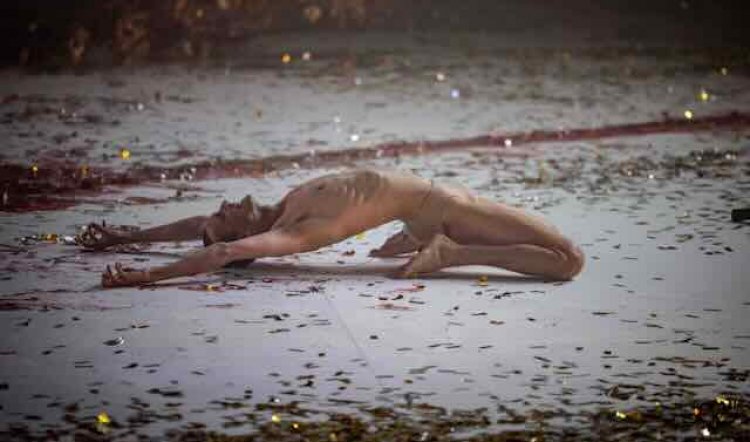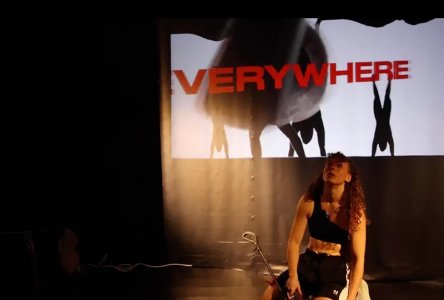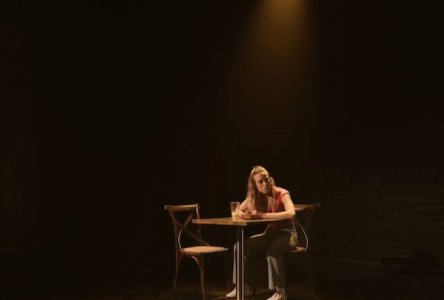-c750x442.jpeg)
GILGAMESH
GILGAMESH, Opera Australia and Sydney Chamber Opera at Carriageworks, 26 September - 6 October 2024. Photography: Daniel Boud
The world premiere of a new opera is a rare event. And the cooperation between Opera Australia, Sydney Chamber Opera, and Carriageworks to bring Gilgamesh fully realised to the stage is thrilling – we need more of this.
On the one hand, it’s the oldest story ever written – The Epic of Gilgamesh – its text pressed into clay tablets 3000 years ago and a mystery for centuries. On the other, it’s also the substantive content of composer-conductor Jack Symonds’ PhD at the Conservatorium, titled more or less mysteriously, Gilgamesh: creation and decreation as operatic form.
The abstract reads: “Through the composition of a 2-hour opera adapting The Epic of Gilgamesh and a written dissertation, I will conduct an examination problematising elements of instrumental writing in order to open pathways re-imagining dramaturgy in opera. The Epic is a foundational text of civilisation that has yet to be made into an opera in English; this work for four singers, two instrumental ensembles and electronics will attempt to fill that gap in the repertoire.
“I will focus specifically on the relationship between instrumental forms that I (and other composers) have made which contain an inbuilt structural and expressive ‘failure’ of musical material to realise its potential in conventional developmental narratives and examine how the resulting music can be uniquely transformed into opera.”
And that’s what you get over three hours running time – not 2 hours 40 minutes as advertised.
-c750x442.jpeg)
The music is played live by the combined Australian String Quartet and Ensemble Offspring, with four superb leading singers: Jessica O’Donoghue (Shamhat/Uta-Napisthi/Scorpion), Jeremy Kleeman (Gilgamesh), Jane Sheldon (Ishtar/Scorpion), Mitchell Riley (Enkidu), and the excellent Daniel Todd (Humbaba/Ur-Shanab).
Because of electronic embellishments to voices (all wear head-mics) and instrumentation, and the acoustic idiosyncrasies of that spectacular cavern, Bay 17, there is inevitable aural distanciation between the work and the audience. (Benjamin Carey electronics and sound design, Bob Scott sound designer). This sense of the disembodied voice is powerful: separated from human origin and existing discretely in the occasional mist of dry ice or extremes of light and shadow. That lighting is by Amelia Lever-Davidson and ranges from massed side spots the length of the arena, to a wall of 60 dazzling white lights revealed when the back wall doors scrape aside in their tracks.
There’s a heightened reality in play from the opening moments as the everyday accessibility of Louis Garrick’s libretto, sung in English and shared via screens on either side of the stage, is juxtaposed with David Fleischer’s glorious out-of-world, out-of-time costumes, and Elizabeth Gadsby’s equally captivating set design. In the first half and acts one to six, the vast, pale-floored ground is dominated by a large, dismembered Chinese Elm.
According to the program, it was removed from its previous career of property damage in the Blue Mountains and repurposed to represent the forests destroyed by Gilgamesh. Its winter-bared branches shimmer with 10,000 hand-made and stitched-on fabric leaves and the effect is ethereally beautiful. Unfortunately, as with so much drama of great battles or demon tempests, the razing of the forest is made less by the telling rather than showing. The tree is removed during the interval, log by log, by the stage crew, and a hand trolley.
Nevertheless, the ancient story that unfolds, so thrillingly over the first half, and in tooth-achingly slow motion in the second, is a curiosity in itself. Pieced together from its cuneiform origins, it tells of gods and their realms as well as Gilgamesh’s ill-fated love for the half-man-half-beast Enkidu, “born of silence”. All of humanity is here in the very mortal essentials of love, loss, jealousy, and death. Add to that the Bull of Heaven and a pair of sinister Scorpions and the visual spectacle rolls on, directed with energetic flair by Kip Williams.

Ironically – for an opera – it’s the women who mainly get to play hard and fast, as characters and musically. O’Donoghue blazes with glittering hauteur assisted by sassy outfits and exhilarating vocal demands. She also shares with Sheldon the overarching dictates of music that is all kinds of antique avant-garde – reminiscent of early Diamanda Galas or Yoko Ono.
Both were memorable for their extremes of vocal utterance. Here composer Symonds echoes that through scream and lengthy passages of sustained high notes to ensure audiences share the character's pain. So, Sheldon’s Ishtar – spurned by Gilgamesh and reduced to elemental rage – is all gut-wrenching base emotion.
Paradoxes abound in Gilgamesh. Its current genesis in the story of the clay tablets – removed to London in a heist that should be an episode of Stuff The British Stole – is as enthralling as the mythic tale itself. And, as homoerotica remains au courant along with electrifyingly independent women, its anachronisms are as contemporary as TikTok. It’s also a conceit, uncommon today, that Symonds wrote his score with these singers in mind, yet the piece is destined to become universal. Particularly if the second half can be energised to match the first. That its creators may have run out of steam is hinted at by repetition, perversely endless slo-mo, and an excess half hour. Even Shakespeare could have done with a good editor.
Comments
Leave a Comment
Enter your username and password to comment. Don't have a username? Register now.




Be the first to leave a comment below